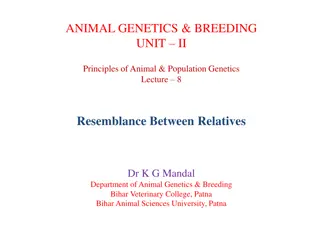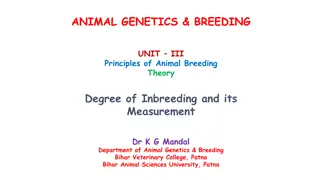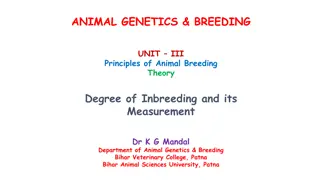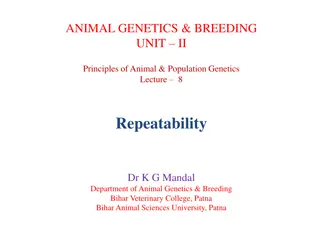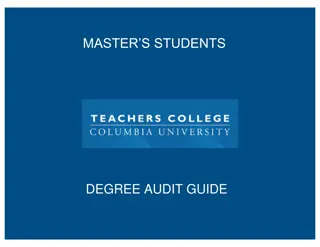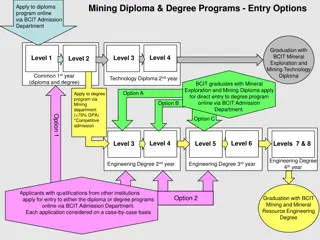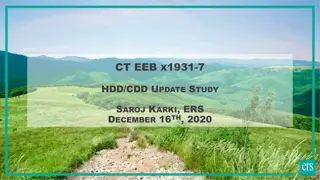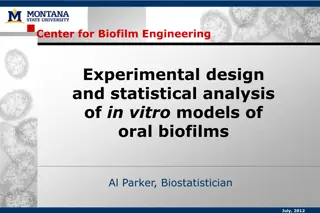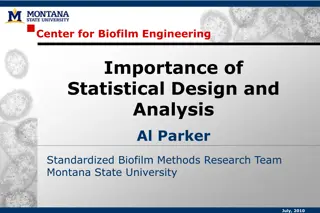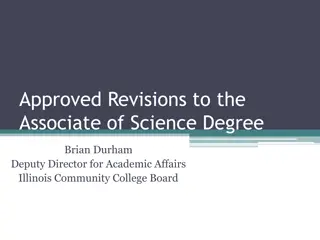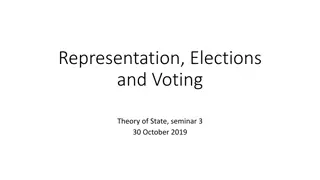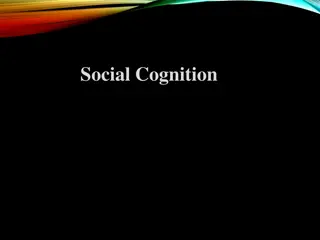The Business Transfer Degree
The Business Transfer Degree at Wenatchee Valley College is designed for students planning to pursue a bachelor's degree in business or a related major. This program offers a direct transfer agreement with various universities in Washington State, preparing students for transfer as juniors with 90 c
0 views • 24 slides
Explore the Two-Year Master's Degree in International Relations Virtual Fair 2024
Join the Master's Degree in International Relations Virtual Fair 2024 presented by the Department of Political and Social Sciences at the University of Bologna. This program offers a comprehensive two-year curriculum covering International Affairs, European Affairs, and Crime, Justice, and Security.
2 views • 13 slides
Why You Should Consider Getting Your Master's Degree in the USA
International students often choose to study for a Master's degree in the USA due to its top-notch academic programs and leading colleges. With over half of the top 100 colleges in the world located in the USA, students can choose their preferred disciplines and customize their degree plans.
9 views • 2 slides
PDF Is MMS degree worth it
In India, a highly desirable postgraduate management degree is the Master of Management Studies (MMS). It typically lasts two years and covers a range of business management course topics. The worth of obtaining an MMS degree varies based on the individual goals and aspirations of the student as wel
0 views • 2 slides
Transformation of Degree: A Lesson in English Grammar
In the lesson about Changing of Degree, students will learn how to transform superlative, comparative, and positive degrees in English grammar. The teacher will cover rules and examples for converting superlative degree to positive degree, comparative degree to positive degree, and more. The learnin
1 views • 22 slides
Understanding Resemblance Between Relatives in Animal Genetics & Breeding
Explore the concept of resemblance between relatives in animal genetics, including direct and collateral relatives who share common genes. Learn how genetic similarities manifest in related individuals and the significance of measuring degrees of resemblance for estimating genetic variance and herit
0 views • 24 slides
Understanding Degree of Inbreeding in Animal Genetics and Breeding
Degree of inbreeding refers to the extent to which an individual carries genes identical by descent. This concept is crucial in animal breeding as it affects genetic diversity and homozygosity in offspring. The coefficient of inbreeding is used to measure the level of inbreeding, with higher values
1 views • 30 slides
Understanding Degrees of Comparison in English Grammar
Degrees of comparison in English grammar refer to the different forms of adjectives and adverbs used to indicate the level of comparison between different qualities. This includes the positive degree for basic descriptions, the comparative degree for comparing two things, and the superlative degree
0 views • 17 slides
Clark College Degree Options and Worksheets
Clark College offers a variety of transferable and non-transferable degrees. The most common transfer degree pursued by Running Start students is the AA/DTA or general transfer degree. Students can find degree worksheets on the college's website to plan their education effectively. Visit the Running
1 views • 4 slides
Understanding Degree of Inbreeding and its Measurement in Animal Genetics and Breeding
Degree of inbreeding in animals is the extent to which genes are identical by descent within an individual. The coefficient of inbreeding, denoted by F, measures this degree and represents the increase in homozygosity in offspring from closely related matings. Two sources of homozygosity are genes a
0 views • 15 slides
Understanding Your Degree Audit for Academic Success
Your degree audit is essential for tracking your progress towards graduation. It outlines your liberal arts core, major, and minor requirements, along with completed and outstanding courses. Learn how to request and interpret your audit, manage transfer credits, and address errors. Keep an eye on ch
1 views • 7 slides
Understanding Exam Boards and Degree Classifications
Exam boards play a crucial role in reviewing students' results, making decisions about their degrees, and determining degree classifications. The process involves marking, moderation, and external examining to ensure fairness and consistency in assessment. Before the final exam board, a moderation a
1 views • 16 slides
Get an online BBA degree from Skyeducation.co.in and take your career to the nex
Get an online BBA degree from Skyeducation.co.in and take your career to the next level. Our online BBA degree program is designed to provide you with the knowledge and skills necessary to succeed in the business world. Visit our site for more info.
3 views • 1 slides
Understanding Polynomial Degrees and Special Names
The degree of a polynomial is determined by its highest exponent, with specific names for each degree level. From the basic constant to the nth degree polynomial, this guide showcases the different degrees and their characteristics, helping you grasp the concept of polynomial functions easily.
0 views • 18 slides
Understanding Polynomials: Types, Degrees, and Zeroes
Polynomial expressions consist of terms with non-zero coefficients. They can have any number of terms and different degrees. Linear polynomials have a degree of one, quadratic polynomials have a degree of two, and cubic polynomials have a degree of three. Zeroes of a polynomial are the values of the
0 views • 17 slides
Understanding Repeatability in Animal Genetics and Breeding
Repeatability in animal genetics assesses the correlation between repeated measurements of a trait on the same individuals. It partitions phenotypic variance into within-individual and between-individual components, aiding in estimating heritability, resemblance between relatives, and genetic determ
0 views • 18 slides
Understanding Field Effect Transistor (FET) and MOSFET Principles
Explore the construction, principles, characteristics, and relationships among parameters of Junction Field Effect Transistors (JFET) through detailed explanations and diagrams. Dive into the equation of drain characteristics and the resemblance to a parabolic curve. Understand the differentiation p
0 views • 9 slides
Understanding Decision Trees in Program Level Creation
Exploring the decision tree for creating program levels for undergraduate and graduate students based on various scenarios such as awarding degrees, beginning new programs, continuing education, and more. The tree outlines the steps taken when students return for a second degree, certificate, dual d
0 views • 4 slides
Risks and Health Impact of Edible Cannabis Consumption in Young People
Edible cannabis products, such as sweets and drinks, pose serious risks to young individuals due to their resemblance to regular sweets, delayed onset of effects, and potential for overdose. Consumption of these products can result in health issues like increased heart rate, cognitive impairment, ps
0 views • 10 slides
New Fourth Degree Official Dress Uniform Information
Explore the details of the new Fourth Degree official dress uniform, including the navy blue blazer, gray trousers, necktie, and black beret with a metal badge. The attire is tailored in Italy with high-quality materials, and each component serves a specific purpose. Orders are to be placed through
0 views • 15 slides
Understanding Homicide: Types and Examples
Homicide is the killing of one human being by another, which can be criminal, noncriminal, or negligent. It may involve deliberate intent, malice, premeditation, and different degrees of murder like first and second degree. Examples include cases of first degree murder, second degree murder, and fel
0 views • 27 slides
Wolves Hockey Summer Challenge - 212 Degree Award Program
Engage in the Wolves Hockey Summer Challenge to earn the prestigious 212 Degree Award by elevating your game one degree at a time. Participate in stickhandling, shooting, and dryland activities to accumulate points towards exciting rewards. Take part in the 10,000 Shot Club and see your name on the
0 views • 9 slides
Master's Degree Audit Guide for Students
Accessing and creating a degree audit is crucial for students pursuing a master's degree. This guide provides step-by-step instructions on how to access the degree audit system, create an audit, and move courses within the program structure. Visual aids accompany each process for easy understanding.
0 views • 23 slides
Understanding Criminal Homicide and Its Classifications
Considered a crime against the person, criminal homicide encompasses various degrees including first-degree murder, second-degree murder, manslaughter, involuntary manslaughter, and negligent homicide. Each degree is characterized by specific elements such as premeditation, malice, intent, and reckl
0 views • 8 slides
BCIT Mining Diploma & Degree Programs Entry Options
Explore the entry options for BCIT's Mining Diploma and Degree programs, including pathways for graduates to transition from the diploma to the degree program. Applicants can choose between diploma or degree programs based on their goals, with competitive admission criteria in place for direct entry
0 views • 10 slides
Exploration of Atavism in "Afro American Fragment" and its Connection to Jack London's Works
The analysis delves into the theme of yearning for a lost past in the poem "Afro American Fragment" by exploring figurative language, imagery, sound devices, mood, and tone. It draws parallels between the concept of Atavism in the poem and its resemblance to Jack London's stories like "The Call of t
0 views • 8 slides
Understanding Data Mining Similarity and Distance Concepts
Data mining involves quantifying the closeness of objects through similarity and distance measures. These measures are crucial for various tasks like recommending similar items, grouping customers, and detecting duplicates in web documents. Similarity metrics ensure objects are ranked correctly base
0 views • 65 slides
Fourth Year CIS Induction and Degree Classification Overview
Explore key information for fourth-year CIS students, including points of contact, degree classification details, curriculum breakdown, and academic year structure. Learn about the importance of final degree classification and the unique features of the fourth year. Understand the distribution of cr
0 views • 18 slides
QUB Foundation Degree in Biological Sciences: Course Overview and Entry Requirements
The QUB Foundation Degree in Biological Sciences is a Level 5 course equivalent to the first two years of a degree program. It offers a pathway towards a BSc (Hons) and covers a range of subjects including Genetics, Molecular Biology, Ecology, and more. The course, spanning two years, provides pract
0 views • 10 slides
Study on Heating and Cooling Degree Days Analysis in Climate Data
This study focuses on analyzing Heating Degree Days (HDD) and Cooling Degree Days (CDD) based on recent climate data and program participation records. It aims to develop utility-specific HDD and CDD values, with considerations for inland and coastal regions. Tasks include weather data collection, r
0 views • 9 slides
Understanding Imperative Form in Scheme Programming
Delve into the world of imperative programming in Scheme, exploring the boundaries of C or Assembly Language resemblance. Discover how Scheme can serve as a robust language for interpreter implementation and contemplate if a simpler language without first-class procedures would suffice for Assignmen
0 views • 18 slides
Statistical Thinking in In Vitro Biofilm Research
Explore the importance of statistical thinking in in vitro biofilm research, including experimental design, uncertainty assessment, and the attributes of in vitro methods like repeatability and resemblance. Learn how statistical thinking helps anticipate criticism, provide convincing results, increa
0 views • 30 slides
Importance of Statistical Design and Analysis in Biofilm Research
The importance of statistical thinking in biofilm research is highlighted through standardized methods, statistical tool applications like ANOVA, and attributes of a standard method such as Relevance, Reasonableness, and Reproducibility. Statistical design aids in generating convincing results, anti
0 views • 33 slides
Degree Works for Graduate Students: A Step-by-Step Guide
Learn how to access and utilize Degree Works for Graduate Students in this comprehensive how-to presentation. Explore steps for accessing the system, reviewing your degree audit, evaluating required classes, checking fallthrough courses, and utilizing the What-If tool. Discover how to address questi
0 views • 10 slides
Understanding Degree Audit: Step-by-Step Guide
Your student degree audit is a comprehensive evaluation of your academic coursework and progress towards graduation. It consists of blocks detailing your demographics, degree requirements, developmental needs, and program-specific courses. Learn how to interpret and navigate your degree audit effect
0 views • 16 slides
Addressing Revisions to Associate of Science Degree in Illinois Community Colleges
Changes are proposed to the Associate of Science (AS) degree model in Illinois Community Colleges to better serve students in science fields. The current model lacks alignment with baccalaureate programs, creating challenges for transfer students. Modifications aim to allow for easier transfer pathw
0 views • 42 slides
Exploring Degree Apprenticeships: A Path Towards Success
Discover the benefits of degree apprenticeships as a viable alternative to traditional university education. Learn about the opportunities, advantages, and unique features of degree apprenticeships, including real job experience, degree-level qualifications, no student loans, and competitive salarie
0 views • 11 slides
Degree Apprenticeships: A Path to Earning a Degree While Gaining Work Experience
Degree Apprenticeships offer a unique opportunity to obtain a bachelor's or master's degree while gaining valuable work experience. Programs such as Digital and Technology Solutions and Diagnostic Radiographer provide real-world learning experiences in partnership with industry leaders. With no tuit
0 views • 12 slides
Theories of Representation: Examining Political Accountability and Public Leadership
Explore the diverse models of representation in political systems, from the trustee and delegate models to the mandate and resemblance models. Should elected officials strictly adhere to campaign promises, lead public opinion, serve party mandates, or mirror societal demographics? Delve into the nua
0 views • 16 slides
Understanding Social Cognition and Schemas
Social cognition explores how people perceive and interpret social information, using automatic and controlled thinking processes. Schemas are mental structures that help us organize knowledge about the social world, affecting how we remember, interpret, and act upon information. The self-confirming
0 views • 23 slides





